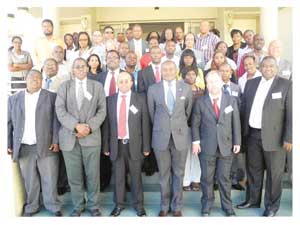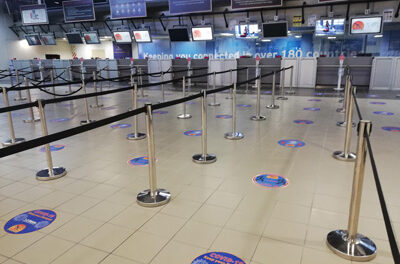
Chemicals legislation and management discussed

Participants at the workshop pictured with Deputy Minister of Environment and Tourism, Pohamba Shifeta (Photograph by Bryn Canniffe)
The workshop is the fourth of its kind in a series of workshops which are aimed at strengthening English speaking African countries to effectively manage chemicals in an environmentally sound manner.
Deputy Minister of Environment and Tourism, Pohamba Shifeta, who officially opened the workshop, said the management of chemicals is a cross-cutting concern hence the need to host such a workshop.”Chemicals are found almost everywhere these days and are essential components of our daily lives. Nontheless, we must be aware that some chemicals can severly damage our health and that others could be harmful to the environment if not properly managed and used,” Shifeta added.
According to the Deputy Minister, sectors such as mining and agriculture use large amounts of chemicals in mineral extraction processes as well as in the application of fertilisers and pesticides in crop production. He said although these sectors contribute significantly to the country’s Gross Domestic Product, the handling, transport and disposal of these chemicals require great care.”We need to make sure that adverse effects on our precious water and soil resouces are minimized from this activities,” Shifeta said.
The previous workshops held in Botswana, Mauritius and Lesotho where meant to skill the participants in chemicals and waste management. However, unlike the first three workshops, the workshop in Namibia is based on the assessment work that has been done in all the participating countries.
The goals of the workshop include sharing experiences during the assessment studies on chemicals legislation and management, creating awareness of the importance of legal aspects, collectively discussing issues, developing recommendations and setting strategic directions. At the Windhoek workshop, participants looked at the particular needs of individual countries and drafter practical solutions.
Studies conducted in other African countries on the effective implementation of international environmental agreements suggest that some of the challenge the countries face include poor legal instruments, lack of policies as well as inadequate management or regulatory systems.
“The focus of the work was on identifying legal and institutional gaps and challenges that the countries are facing. The analysis was focused on the existing institutional arrangements for chemicals management to suggest improvements that will lead to environmentally sound amangement of the chemicals going forward,” said Taelo Letsela, Executive Director of Africa Institute. He said during the workshop, these challenges will be analysed to come up with workable recommendations.
The workshop ends Friday, 8 February. It is conducted by the Africa Institute in collaboration with the Swedish Chemicals Agency, KEMI.












































